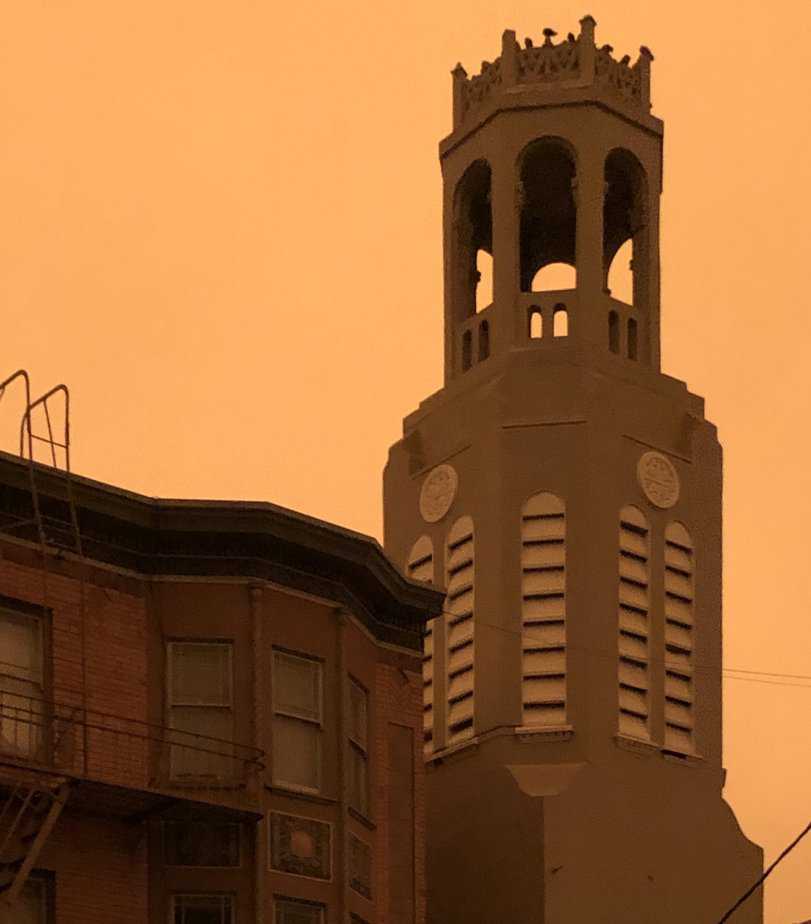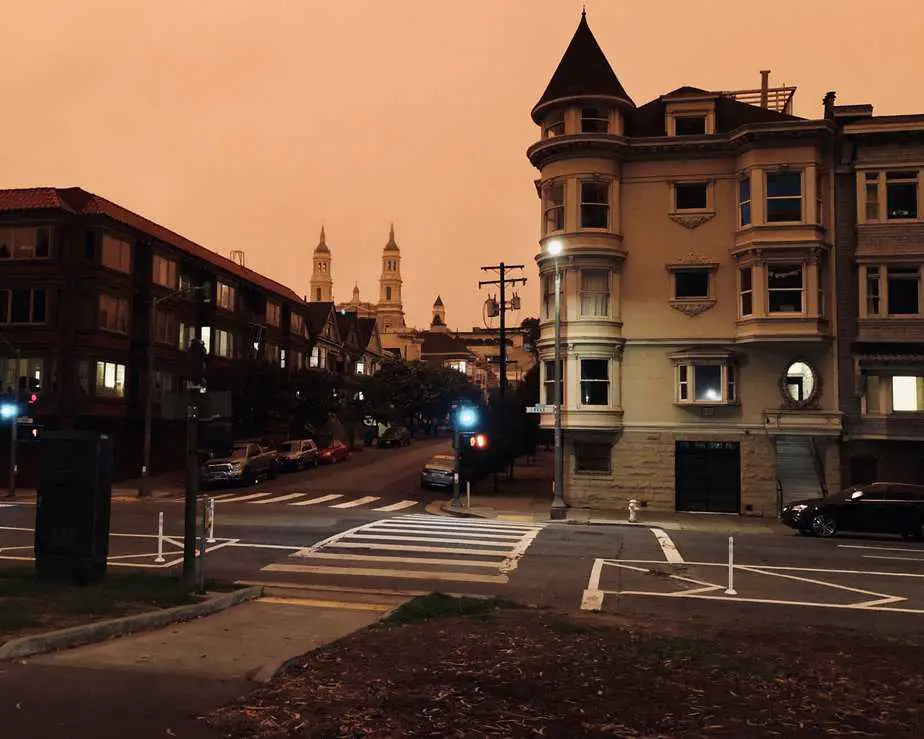On 7th Avenue, I pass the steeple of the Presbyterian Church: a pseudo-Pacifica-style affair from the late 1920s. Perched on each of the steeple’s filigrees sits a cadre of birds, unidentifiable in the wan, orange light.
I am reminded of Samuel Pepys and the Great Fire of London. Pepys (pronounced “peeps”) is the diarist to end all diarists. He describes the inferno that decimated London in September of 1666 with moments of sublime tenderness directed at animal life (unfortunately, Pepys did not extend his spirit of generosity to the working classes of the city).
The entry reads as follows:
“Everybody [endeavoring] to remove their goods, and flinging into the river or bringing them into lighters that layoff; poor people staying in their houses as long as till the very fire touched them, and then running into boats, or clambering from one pair of stairs by the water-side to another. And among other things, the poor pigeons, I perceive, were loth to leave their houses, but hovered about the windows and [balconies] till they were, some of them burned, their wings, and fell down.”
Passing through Golden Gate Park, the frilly Victorian greenhouse of the Conservatory of Flowers is still lit up like a Castro reveler with their makeup smeared from a wild night out. The SkyStar Observation Wheel in the Music Concourse, still incomplete, towers above a statue dedicated to the Scottish poet Robert Burns.
“I’m truly sorry man’s dominion has broken nature’s social union,” I think, reciting one of his poems in my mind.
A part of me wants to interrogate this bronzed poet, to ask him if his pastoral poesy means anything to modern Americans. So many seem to actively hate the planet, willing to plunder its gifts like a caricature of an insatiable railroad baron or oil magnate.
(Images of Wyoming and its strip mines, of Pittsburgh and its fracking and water faucets set aflame come to mind. The wheel, the statue, the Japanese tea garden all seem like artifacts of a lost society — a nation of outdoor pleasures that seem impossible in the year 2020, if for no other reason than the red clay-colored skies above my head.)
I leave the park and bike to Safeway, parking along Market Street. A man and woman stand on the edge of an asphalt parking lot, gazing up at Twin Peaks and commenting on the color of the sky.
“Just another day in Normalville,” I comment, but my mask muffles my voice and the woman looks perplexed. She pauses and, as I walk away, says, “Have a good night!”
It’s 10:45 in the morning.
Inside the Safeway, an elderly man repeatedly asks a store clerk for liquid aminos. At first, she humors him and pretends to understand what he’s asking for, but then goes back to stocking. I find the searched-for bottle and hand it to the man; he is grateful.
I stop by a friend’s house. Yesterday, he got the letter every San Francisco tenant dreads: an Ellis Act Eviction. And there isn’t much you can do when faced with one.
I bring him a small porcelain dog that I bought on 9th Street from the Oriental Art Gallery. It reminded me of Griswold, the dog he adopted right when the world started falling apart in March.
Turning down 19th Street and working my way along the perimeter of Dolores Park, my view of the city is bifurcated by two massive moving vans. A ruddy-faced man who appears to be in his 50s peers out at me from the darkness of an apartment building garage, sweating from exertion.
I continue walking.
A young man in glasses stands on his tiptoes, balanced perfectly on the second story apartment building fire escape above me. Across Church Street, another man leans in the shadows of the J-Church right-of-way, smoking a joint. It’s hard to say what is happening between the two of them.
I take in the postcard of the city from the top of Dolores Park. A well-dressed man with wavy brown hair approaches me and our eyes meet. This happens often now that we’re all wearing masks, and still my heart skips a beat when anyone looks me so directly in the eyes.
“What do you say… this looks more like 6? 7 o’clock at night?” I offer.
He shakes his head and looks legitimately distressed.
“How can anyone look at this and not think climate change is real? It’s heartbreaking.” I pick up on a gentle European accent in the cadence and tone of his voice.
I feel tired, and I keep getting soot in my eyes. It’s time to turn homeward.
I find another bike station and, imitating a frustrated Edwardian housekeeper, run my index finger along the bike’s vinyl seat. The tip of my finger is black with grime and dirt from the particulate in the air. I mount the bike and can see it falling in the bright, white light of the headlamp.
I stop to take in the small garden of a Chinese American church in the Inner Sunset. I see that the soot has blemished one of the last roses of summer, and that melody begins to play in my mind. I touch the withering, dried out leaves, wiping them clean of the choking soot. The rose bush has been neglected over these trying months, and I see the petals of dead flowers spread across the mulch below.
Later, a friend points out that this image of a soot-covered rose is practically a trope of industrializing societies in the nineteenth century. I feel as though I have plagiarized.
At home, I sit at my desk facing Judah Street and write. I think of Burns and Peyps and all the other conventional white authors from the United Kingdom that occupy not an insignificant part of my library. (And my brain, it would seem.)
I wonder what horrors they witnessed in their day. Fires, disease, and “what man has made of man.” Wars with bayonets and crap firearms.
I wonder what poetry is left in this city. But still, I write.
// Feature photo courtesy of Alexander Gray.





